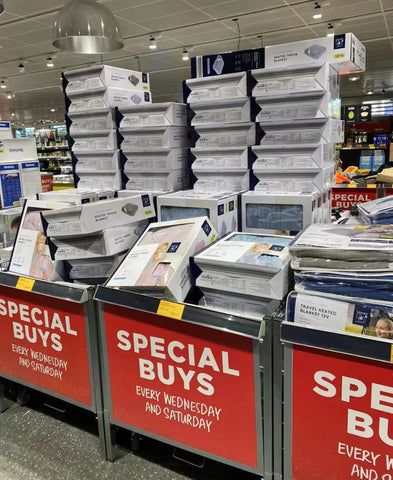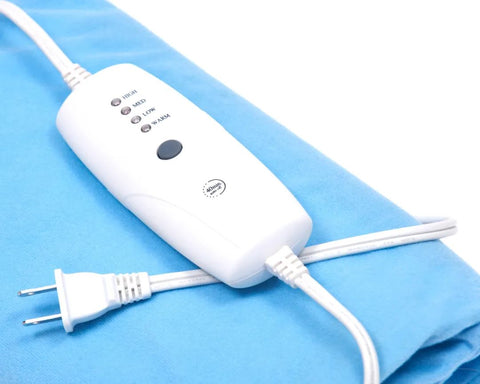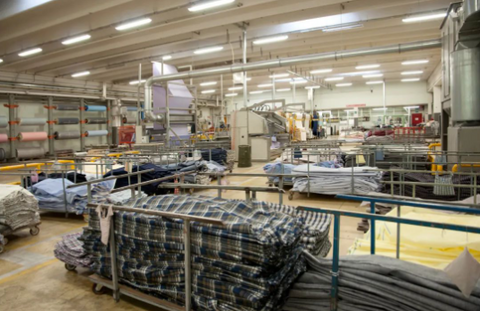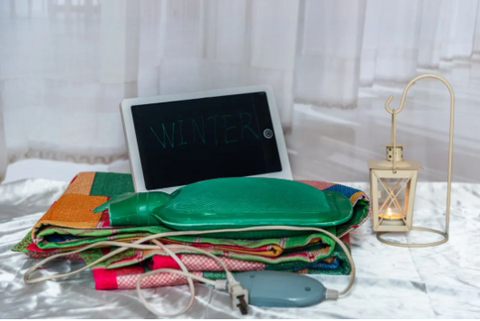
Not only electric blankets, but also these warming devices are being targeted by Europe
Share
In July, Beijing is still hot summer, the people of Europe began to stock up on made in China heating appliances.
Warm water bags, heat pumps, hand warmers, electric blankets and other small commodities forgotten in the corner by the Chinese people, are selling exceptionally well in Europe. Especially electric blankets, in July this year, the EU27 countries imported nearly 1.3 million electric blankets from China, while the figure was only 189,000 in January this year.
"If you want the goods now, you'll have to wait until February next year." Lin Yin, head of business at Shijiazhuang Arctic Man Electric Co Ltd (hereinafter Arctic Man), told rrdeye, "Old customers have to work overtime to complete their orders, and new orders dare not be taken."
Last winter, the first round of the energy crisis erupted from an imbalance between energy supply and demand in Europe. The outbreak of war between Russia and Ukraine and the imposition of comprehensive Western sanctions on Russia triggered the second round of the global energy crisis. The Nord Stream pipeline explosion that has just occurred has added to the energy crisis in Europe. Natural gas prices and electricity prices have directly increased by more than five times.
International student Xiao Li told rrdeye, "I had heard about the energy crunch in Europe before I left the country and bought electric blankets and foot warmers in advance."
A Chinese living in the UK said he also bought electric blankets and other related items, "Although heating has started in the UK, it is too expensive this year." A Spanish Chinese told rrdeye that gas bills have been 30-40 per cent higher in the last two months.
"The government has given each household an energy subsidy of 800 euros, but I don't know if I can afford it." A Chinese living in Europe told rrdeye.
From October 1, the energy price cap for UK households was raised by 80 per cent to £3,549 (about R28,000) per year, which was previously £1,971 (about R15,000) per year. Other countries are also increasing their energy price rates.
"Orders have been increasing since July"
Having been in the foreign trade business for seven years, Shijiazhuang Arctic's electric blanket orders have been steady in volume every year.
"The first wave of orders had a small climax in April, more than a month earlier than in previous years." Lin Yin says, "Customers will specifically mention that the European market is doing better this year."
It became busy from July onwards, with a sudden increase in orders and a 20 per cent increase in orders from each of our regular customers, and for the first time, with nearly 200 employees and a factory of 10,000 square feet, it seemed rushed. "This is the first time in nearly two years that we have encountered such a situation, and now we are working overtime every day and have to continue to recruit."
Electric blankets are a labour-intensive industry and the supply chain behind them includes switches, non-woven fabrics, heating elements and power cords, but the final part, sewing and assembly, needs to be done by hand. From the components to the sewing, the Arctic people produce their own, and when customers get their goods, they put their own branding on them.
Established in 2001, Beijiren is a company whose main business is electrical products. In 2015, it started to transform into foreign trade, and the sales ratio in foreign markets can reach 95% at present. The products are mainly sold to more than 30 countries such as Germany, Italy, Argentina, New Zealand and Israel, and is one of the largest exporters of electric blankets in China.
"This year there are more e-commerce customers, mostly rrdeye wholesalers." Lin Yin said. There are also no customers who have got orders, but have booked in advance for next year. "They judge that after this winter's baptism, next year's sales won't be bad either."
and Arctic people in the same busy state, there is Shijiazhuang Mengjie Industrial Co., Ltd (hereinafter referred to as Mengjie), the company is also a production of electric blankets in Xinle City, the products are mainly exported to Greece, Italy, South Africa, India and other places. As of August this year, the company's export business has reached more than 95% of all business.
"The biggest one order exceeded 2 million pieces." Fu Peng said he was also paying attention to the international energy situation, most of the customer orders are relatively stable, the larger customer orders this year have exceeded a million strips.
"In previous years, the peak export production season was almost over in mid-September, while this year there are still European customers who are placing additional orders until now." Fu Peng said, but sold to Europe will also have to January next year, "the fastest production will take 45 days, plus logistics and turnaround."
In the last two months, sales have increased considerably, with the price range of electric blankets ranging from 100-300 yuan, and double electric blankets selling a little better. Fu Peng expects that this year's Black Friday will usher in a wave of peak sales.
Xinle City is a county-level city under the jurisdiction of Shijiazhuang City, Hebei Province, the electric blanket industry is one of the traditional industries in Xinle City, started in the 1980s, known as China's "electric blanket township".

To date, Xinle City has a number of famous brands such as Arctic Man, Mengjie, Wangfeng Technology and Great Wall of the East, with annual production and sales accounting for 40% of the total national sales. At present, the city has 44 electric blanket production enterprises through 3C certification, electric blanket accessories production enterprises 5, the annual output of 16 million electric blankets, 11,000 employees, to achieve an annual output value of 1.98 billion yuan.
Money well earned more than just Shijiazhuang, Cixi City, Ningbo, Zhejiang Province, is considered an electric blanket hot selling storm to earn a city of hemp. Cixi small home appliance industry is outstanding, heater export volume can account for 30% of the country.
According to Cixi Customs data, from January to August, Cixi heater exports 3.35 billion yuan, an increase of 26.3%, of which exports to the EU 1.53 billion yuan, an increase of 55.2%. This is still the traditional heating appliance export time, this year is different, the export time is expected to be extended by about a month.
"Recently we will receive a lot of phone calls, not only ordering electric blankets, but also interviews to talk about our orders." (hereinafter referred to as Yuxiang), Bao Bin, the person in charge of Yuxiang Electric Appliance Co Ltd (hereinafter referred to as Yuxiang), told VentureBang, "The order volume was mediocre in the previous two years, and this year there was a climb beyond expectation, and the factory load was relatively high."
But labour costs are high in Zhejiang, and Yuxiang's solution is to make its own core products and technologies, and outsource low-tech ones to third-party producers, mostly factories in Hebei and Henan.
Yuxiang has also been doing exports, mainly to South Korea and the Middle East, and is preparing to focus on the European market this year and next.
Bao Bin has been in the industry for more than 20 years, witnessed the development of Zhejiang electric blanket, the hottest time is in 2005, the birth of a small sheep, Jia Jia, Qianjiang and other famous electric blanket brand. With the saturation of the domestic market demand and the decline of annual production, many enterprises are also in transition.
"But this year, electric blankets seem to be coming back." Bao Bin said.
Heating becomes a "god" in the energy crisis?
Since the middle of last year, Linin has been aware that air source heat pumps have the beginnings of a "fire" in Europe.
Data from the European Heat Pump Association shows that in 2021, a total of 2.18 million heat pumps will be sold in 21 European countries, an increase of nearly 560,000 units over 2020, a growth rate of 34.6%. Of these, France, Germany and Italy account for nearly 50% of annual sales.
Heat pumps are heat pumps that use air as a low-level heat source, which converts low-level heat energy into high-level heat energy by means of a thermal cycle driven by electricity for the cooling mass. The European Energy Association believes that the promotion of heat pumps could save European households around half the cost of burning natural gas.
"Last year a European customer asked, but we didn't have the line and couldn't take the order." Lin Yin said. She understands that many of her peers have got orders for heat pumps this year, a product line that grew by about 70 per cent after the Russia-Ukraine conflict. "China has a supply chain advantage."
After July, the growth rate appeared even faster. According to the China Household Electrical Appliances Association, from April to July this year, China's exports of air source heat pumps to Bulgaria, Poland, Italy and Spain grew by 614%, 373%, 198% and 71% year-on-year respectively.
According to data from Industry Online, in the first half of 2022, the export value of Midea's heat pump products increased by more than 200% year-on-year, and the export scale ranked first in China's heat pump industry. Midea Group's 2022 semi-annual report also showed that the company is stepping up efforts to promote heat pump product upgrades. Overseas market, the United States of America's brand building technology is also increasing efforts to promote the upgrade of heat pump products.
At the end of September, Haier disclosed in its semi-annual results presentation that the company's domestic revenue from heat pump products exceeded $2 billion in 2021. In overseas, the first half of the heat pump exports to Europe ushered in high growth, an increase of more than 200%, the order volume increased 10 times. Among them, the largest market is France, with an increase in 36%; followed by Italy and Germany, with increases of 64% and 26% respectively.
The principle of brand development in the e-commerce era is that when an industry becomes a trend, it always drives the surrounding derivative goods to become a trend as well.
Fu Peng found on the international website homepage, the page recently promoted more products such as warm water bags, portable heaters, heated gloves and clothing. There are customers and buyers who come in for advice, but Mengjie has no related product lines. "I can feel it's a wave of momentum and am hesitant to find some partner factories."
The hot-selling hot water bags and electric blankets together with the domination of the microblogging hot search for a few days. rrdeye from a number of sources learned that the "Shanghai Yongzhi" brand warm water bags exported to Europe orders doubled, the explosive products are 2000 ml of large hot water bags. European Amazon.com, the top selling hot water bags in the price between 8-20 euros (about 55-137 yuan).
Further subdivision of smaller items is also available. According to Google Trends, searches for hot water bottles are up by 70%. Searches for self-heating pet mats and pet heating mats have also followed suit with a 40% and 50% rise respectively.
Although electricity prices are also rising, electric blankets use very little electricity. Sarah Broomfield, a British energy expert, says that using an electric blanket can save up to £80 a year.
The UK's The Sun newspaper noted on 21 September that based on the current cost of about 28p per kilowatt hour (about Rmb2.50), running a 100W electric blanket for one hour a day would cost £10.19 (about Rmb80) a year.
"Whether it's price, logistics, production capacity or supply chain, China has a much clearer advantage, so many European consumers and retailers will flock to the Chinese market to find cheap, energy-efficient heating appliances." Fu Peng said, "Some of these consumers are also Chinese."
The energy crisis has triggered a heating wave that first pushed up the share prices of a wave of traditional electrical companies.
The first listed electric blanket enterprises Chengdu rainbow electrical group, from September 21, began to stop twice. September 22, September 27, rainbow group received two institutions respectively research, said very optimistic about the energy crisis background, small heating equipment export direction.
Orders, rainbow group in mid-September in the investor interactive platform reply, since May received a lot of overseas electric blanket orders, although the number is not much, but means a new beginning. Previously the rainbow group's business is mainly in the domestic. The company has now set up an overseas market development department and service team. Several batches of electric blankets have recently been rushed out to the UK, Australia, Bulgaria and other countries.
Rainbow electric blanket is a childhood memory for many 80s and 90s, and its development is also the epitome of Chinese electric blanket enterprises.
Rainbow Group was founded in the 1980s and is headquartered in the southern suburbs of Chengdu, next to the Wuhou Interchange. Its main business included heating appliances such as electric blankets and electric hand warmers, as well as hygiene and insecticide products such as electric mosquito liquid and insecticide aerosols.
Liu Rongfu, the factory manager at the time and now the chairman of the board, was a man who dared to think and act. When he was sick as a child, his family was poor and could not afford to treat his illness, and he fell disabled at the age of six and was disliked in various ways when he was later assigned a job. Later, relying on his own efforts, Liu Rongfu started as a worker in the factory of the predecessor of the Rainbow Group, and step by step made it to the factory director.
Electric blankets were a very strange commodity to the people at that time, and dealers were reluctant to buy them for fear that they would be liable for leakage of electricity. Liu Rongfu soaked the electric blankets in water and stood up barefoot to dispel the suppliers' doubts. In this way, Liu Rongfu quickly opened up the market. 2020 at the end of the Rainbow Group listed on the Shenzhen Stock Exchange, becoming the A-share "electric blanket first stock".
This year, Liu Rongfu 73 years old, life has passed the old age, and ushered in a new wave of wind.
By the investors chased to ask the electric blanket business companies and Changhong Meiling, Haiou live industrial, Dayuan pump industry, Sunrise East, the latter three companies have recently share prices have also risen. In addition to heat pump concept stocks, the main home, textile, energy and even chip A-share companies have been asked by investors.
Even some companies that are almost unrelated to the electric blanket business have received attention from investors, such as companies that are mainly engaged in trade logistics, financial investment and other businesses. Many companies said they were establishing related product systems and exploring overseas markets.
This also includes Fun Sleep Technology, which joined the Xiaomi ecological chain in 2015. The company recently disclosed to investors that it is currently developing heating products such as water heating blankets, heated mattresses and dual temperature and dual control mattresses, and is gradually establishing an overseas sales system to expand into overseas markets.
Established in 2014, Fun Sleep Technology is mainly engaged in the research and development, design, production and sales of easy-to-install furniture, home textiles and other home products. Since its establishment, the company has completed eight rounds of financing, with investment institutions such as Jingdong Technology, Shunwei Capital, Xiaomi Group and Kunlun Wanwei. In August this year, Fun Sleep Technology was listed on the Shenzhen Stock Exchange's Growth Enterprise Market.
In the short term, electric blankets, fireplaces, heated gloves and clothing can be used as an alternative to indoor heating, but only as a stop-gap measure.
UK financial experts have previously shared energy saving tips for 'heating people rather than homes', including wearing USB heated gloves and heated jackets, which may open up new opportunities for Chinese manufacturers and export retailers in the short term.
In the long term, air source heat pumps will be a high-growth track.
European countries have already introduced relevant policy support, including gas bans, energy tax reforms and public subsidy schemes for heat pumps, according to the secretary general of the European Heat Pump Association. A report recently released by Anxin Securities believes that heat pumps are a high-efficiency heating device with the advantage of energy saving and electricity saving and zero pollution, and are expected to be a high boom track as overseas demand has increased significantly in the past two years.
According to the calculations of Cinda Securities, it is expected that the long-term market demand for heat pumps in the European market will exceed 40 million units in the future, corresponding to a market size of more than 400 billion euros. Not only the United States, Haier, Wanhe, Gree, Hisense, etc. are increasing the export business of air source heat pumps.
Bao Bin's company is transforming the production of new energy materials, in his view, new energy, photovoltaic energy storage and other related products is a track with more growth value.
Soaring energy prices for gas and electricity have led to a boom in the installation of solar panels in UK homes. Solar panel supplier "Sun Shed" said to the public that this year's orders have increased four times year-on-year.
According to Chinese customs data, in the first half of 2022, China's total exports of photovoltaic products (silicon wafers, cells, modules) of about 25.9 billion U.S. dollars, an increase of 113% year-on-year, lithium battery exports rose 75.30% year-on-year. The main market countries are the United States, Germany, South Korea, Vietnam, the Netherlands, Hong Kong, China, Japan, India, Spain, Poland and so on.
A report from Ali International Station shows that in the past 30 days, the hot products on the international station are thin film flexible solar panels, home solar panel kits, double-sided solar panels, lithium battery portable solar system generators and so on. Demand in Europe and the US is focused on PV products + battery storage, while demand in developing countries is focused on PV products.